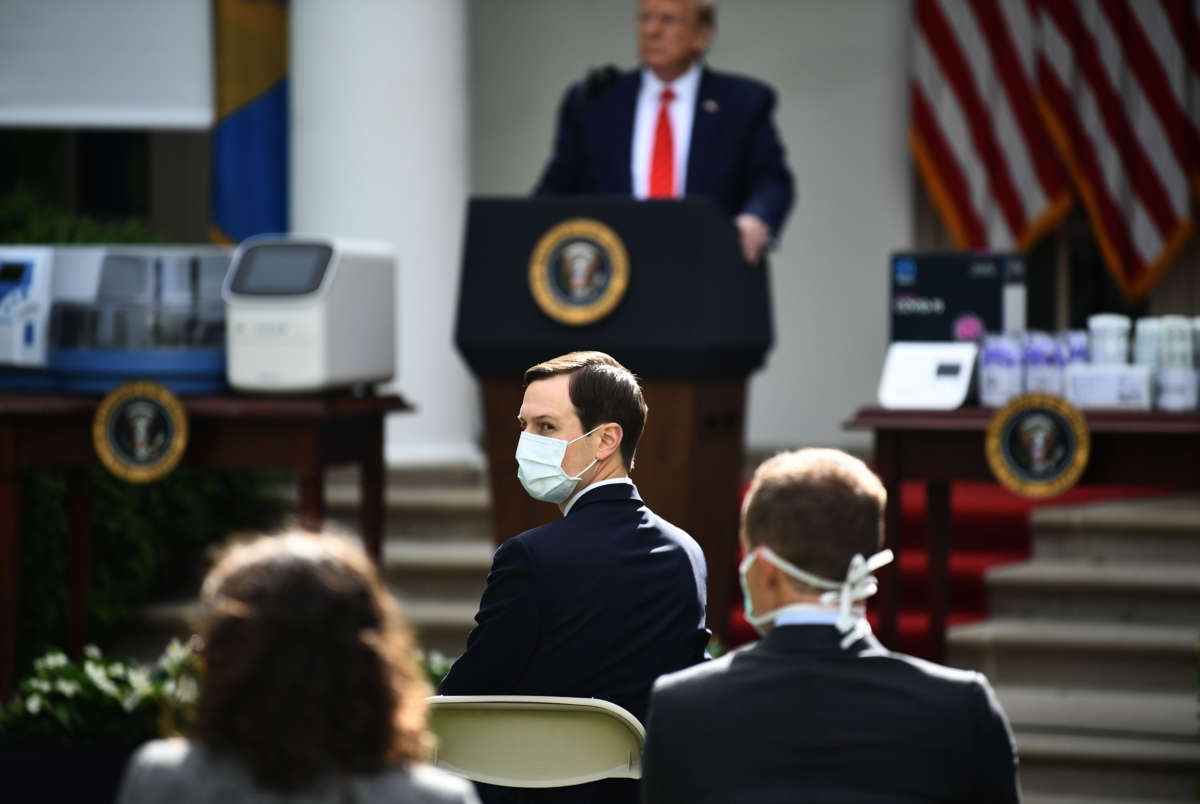Support justice-driven, accurate and transparent news — make a quick donation to Truthout today!
Jared Kushner created a stir on Tuesday evening when an interview with him was published online in which he expressed how the Trump administration was possibly considering delaying the 2020 presidential election date due to the coronavirus pandemic.
In an interview with TIME magazine, when questioned whether the general election would still be held on November 3, Kushner gave an ambiguous answer.
“I’m not sure I can commit one way or the other, but right now that’s the plan,” Kushner said, implying (though not promising) that the election would likely still be held on the date it is mandated to occur on.
On Wednesday, following an uproar in the media, Kushner tried to walk back those comments, stating that he was not aware of any “discussions” happening in the White House at this time on the subject of delaying the election. However, his words did not ease many people’s minds, as he did not guarantee that such conversations weren’t happening at all.
President Donald Trump’s son-in-law, who also serves as one of his top advisers in the White House, does not have any powers delegated to him that would allow a delay in election dates from his order alone. Nor does Trump, for that matter: according to constitutional experts, the president cannot delay an election on his own without Congress consenting to change the date, even though others have privately expressed worries that he may still try to do so, using the COVID-19 crisis as a means to stay in office longer.
Former Vice President Joe Biden, who is the Democratic Party’s presumptive presidential nominee, stated last month that he believed Trump was going to do something iniquitous when it came to this year’s elections.
“Mark my words, I think he is going to try to kick back the election somehow, come up with some rationale why it can’t be held,” Biden said.
Biden also brought up an interesting possibility, that Trump may try to interfere in the elections in other ways — including by refusing to fund the United States Postal Service (USPS), thereby making it more difficult for people to vote by mail if COVID-19 still posed a public health threat by this fall.
“Imagine threatening not to fund the post office. Now, what in God’s name is that about? Other than trying to let the word out that he’s going to do all he can to make it very hard for people to vote,” Biden said at the time.
Trump has indeed expressed disdain for voting by mail as an option to allow elections to happen unimpeded from the continued spread of COVID-19. “No, mail ballots, they cheat,” Trump said in early April, in spite of no evidence that fraud occurs through the use of mail-in ballots (indeed, Trump himself has voted by mail).
While Trump has expressed misgivings about voting by mail, he has taken actions that appear to be immobilizing the ability of the USPS from being able to function properly later this year.
This week, Deputy Postmaster General Ronald Stroman, a strong proponent of mail-in voting, was reportedly forced to resign from his position. Stroman’s departure came about just one week after Louis DeJoy, a prominent donor to the Republican Party and a supporter of Trump’s, was named the agency’s new Postmaster General.
There are other reasons to be concerned. The USPS is facing a significant budget shortfall due to the coronavirus crisis, with the possibility that it could run out of funding by September without action from Congress and by the president. But Trump has said in recent weeks he will not agree to any funding increases unless changes to his liking are made at the USPS.
A terrifying moment. We appeal for your support.
In the last weeks, we have witnessed an authoritarian assault on communities in Minnesota and across the nation.
The need for truthful, grassroots reporting is urgent at this cataclysmic historical moment. Yet, Trump-aligned billionaires and other allies have taken over many legacy media outlets — the culmination of a decades-long campaign to place control of the narrative into the hands of the political right.
We refuse to let Trump’s blatant propaganda machine go unchecked. Untethered to corporate ownership or advertisers, Truthout remains fearless in our reporting and our determination to use journalism as a tool for justice.
But we need your help just to fund our basic expenses. Over 80 percent of Truthout’s funding comes from small individual donations from our community of readers, and over a third of our total budget is supported by recurring monthly donors.
Truthout has launched a fundraiser, and we have a goal to add 242 new monthly donors in the next 48 hours. Whether you can make a small monthly donation or a larger one-time gift, Truthout only works with your support.
